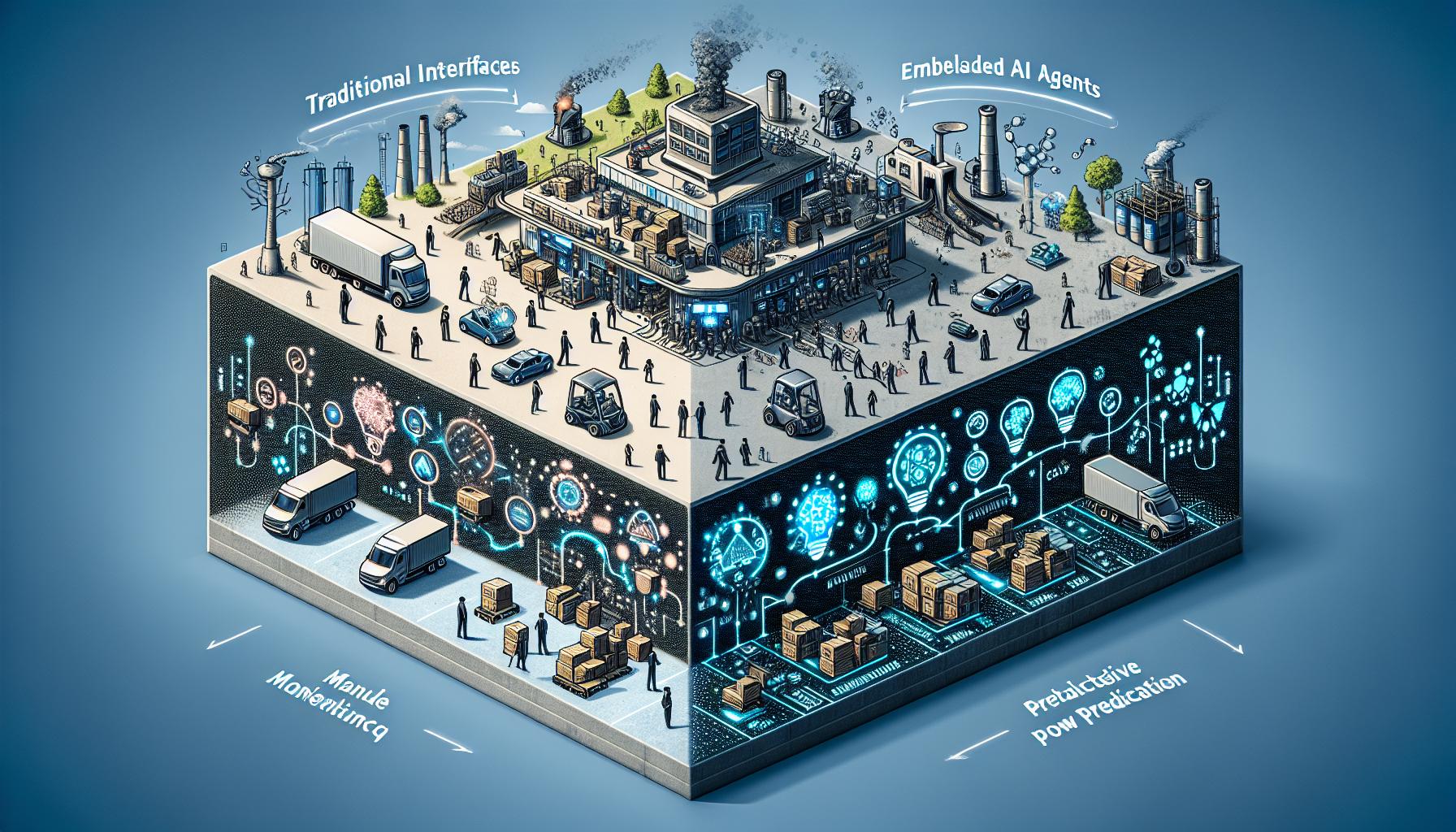Smart Supply Chain Management: Embedded AI Agents vs. Traditional AI Interfaces

Introduction
In the rapidly evolving landscape of supply chain management, technological advancements are continuously shaping the way businesses operate. Among these advancements are Artificial Intelligence (AI) technologies, which have become integral in optimizing supply chain processes. Traditionally, AI interfaces like ChatGPT have provided significant improvements by leveraging natural language processing to facilitate communication within supply chain operations. However, the emergence of embedded AI agents marks a revolutionary leap, offering functionalities that surpass the capabilities of traditional AI interfaces.
Embedded AI Agents vs. Traditional AI Interfaces
When comparing embedded AI agents with traditional AI interfaces, several key distinctions emerge. Traditional AI interfaces, such as ChatGPT, primarily focus on enhancing communication and decision-making through natural language processing and machine learning. They assist human operators by providing intelligent responses to queries and offering insights based on data analysis. While these capabilities have undoubtedly improved efficiency, they still rely heavily on human intervention to execute tasks.
On the other hand, embedded AI agents are tightly integrated within supply chain systems and operate autonomously. By embedding AI directly into the operational framework, these agents can perform real-time monitoring, predictive analytics, and automated decision-making. The shift from reactive to proactive supply chain management is profound, as embedded AI agents can seamlessly identify and address issues without waiting for human input.
Real-Time Monitoring
One of the most significant advantages of embedded AI agents is their ability to perform real-time monitoring. These agents continuously analyze data from various sources, such as IoT devices, sensors, and enterprise resource planning (ERP) systems. By processing this vast amount of information instantaneously, embedded AI agents can detect anomalies, track shipments, and monitor inventory levels in real-time, ensuring optimal performance throughout the supply chain.
For example, a global manufacturing company implemented embedded AI agents to monitor its supply chain. The agents identified delays in shipment routes caused by unforeseen weather conditions. By rerouting shipments and optimizing delivery schedules in real-time, the company was able to minimize disruptions and avoid potential losses. This proactive approach would not have been feasible with traditional AI interfaces, which would require human intervention to identify and address the issue.
Predictive Analytics for Demand Forecasting
Embedded AI agents excel in predictive analytics, a critical functionality for demand forecasting. By analyzing historical data, market trends, and external factors, these agents can accurately predict future demand patterns. This capability allows businesses to make informed decisions regarding inventory management, production planning, and resource allocation.
Consider a retail giant that integrated embedded AI agents into its supply chain. The agents analyzed past sales data, social media trends, and economic indicators to forecast product demand for the upcoming season. As a result, the retail giant optimized its inventory levels, reducing excess stock and minimizing the risk of stockouts. The accuracy of these predictions led to significant cost savings and improved customer satisfaction.
Automated Inventory Management
Automated inventory management is another area where embedded AI agents shine. These agents can autonomously monitor inventory levels, track expiration dates, and manage restocking processes. By automating these tasks, businesses can reduce the risk of human error and ensure that inventory is always at optimal levels.
An automotive parts supplier successfully implemented embedded AI agents to manage its inventory. The agents monitored stock levels in real-time, placing automatic orders for replenishment when inventory fell below predefined thresholds. Additionally, the agents identified slow-moving items and recommended promotional strategies to clear excess stock. This level of automation streamlined the supplier's inventory management process, reducing carrying costs and improving overall efficiency.
Case Studies of Success
Several businesses across various industries have experienced transformative benefits by integrating embedded AI agents within their supply chain systems.
Case Study 1: Pharmaceutical Industry
A leading pharmaceutical company faced challenges in managing its complex global supply chain. By deploying embedded AI agents, the company achieved real-time visibility into its supply chain operations. The agents monitored medicine stock levels across multiple distribution centers, ensuring timely replenishment and minimizing the risk of stockouts. This led to a 30% reduction in inventory carrying costs and a 20% decrease in order fulfillment time.
Case Study 2: E-Commerce Sector
An e-commerce giant implemented embedded AI agents to enhance its order fulfillment process. The agents analyzed real-time order data, traffic conditions, and delivery routes to optimize the dispatch of delivery vehicles. This resulted in a 25% reduction in delivery times and a 15% decrease in operational costs. Additionally, the agents proactively identified potential bottlenecks, allowing the company to address them before they impacted customer satisfaction.
Conclusion
Embedded AI agents represent a paradigm shift in supply chain management, offering capabilities that extend far beyond traditional AI interfaces. Through real-time monitoring, predictive analytics, and automated inventory management, these agents empower businesses to operate more efficiently and effectively. The case studies presented highlight the substantial benefits of integrating embedded AI agents into supply chain systems, from cost savings to improved customer satisfaction. As the landscape of supply chain management continues to evolve, embracing these innovations will be crucial for businesses striving to maintain a competitive edge.
Keywords: Supply Chain Management, Embedded AI Agents, Traditional AI Interfaces, Real-Time Monitoring, Predictive Analytics, Automated Inventory Management, RAIA




